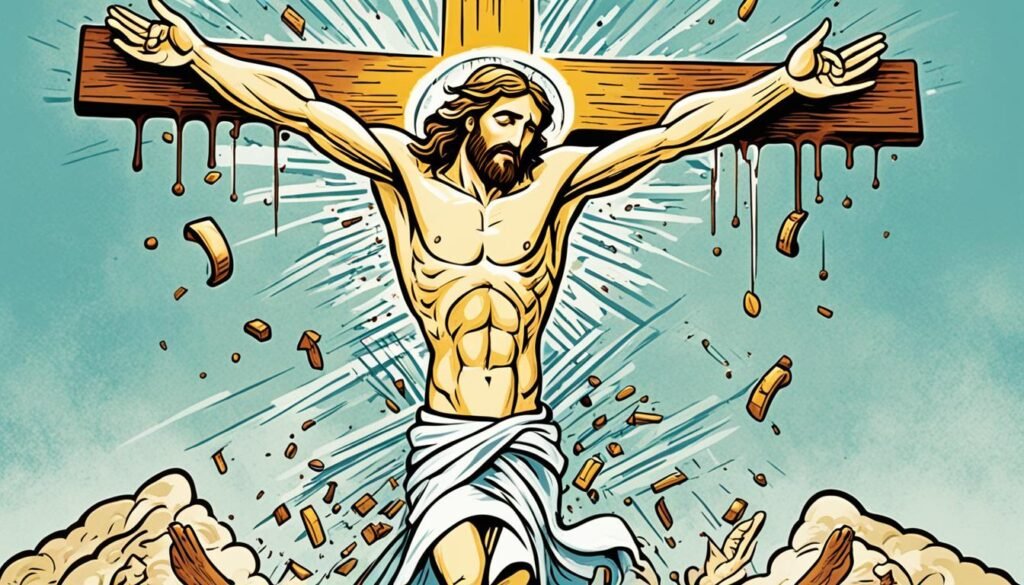Jesus’ death on the cross holds profound significance in Christian theology and history. It is important to understand what he accomplished through his sacrifice.
Key Takeaways:
- Jesus’ death on the cross is central to Christian theology and history.
- Understanding what Jesus accomplished on the cross is crucial for believers.
- His sacrifice brings redemption and reconciliation with God.
- The crucifixion demonstrates God’s great love and willingness to save humanity.
- Jesus’ sacrifice holds the power to bring healing and sanctification to believers.
The Six Core Things Christ Accomplished in His Death
When Jesus died on the cross, he accomplished six core things that have profound significance in the Christian faith. These include expiation, propitiation, reconciliation, redemption, defeat of powers of darkness, and substitution. Each of these concepts reveals the depth of Christ’s sacrifice and the transformative power of his death.
Expiation – Removal of Sin and Guilt
Expiation refers to the removal of sin and guilt. Through his death, Jesus took upon himself the sins of humanity, offering himself as the ultimate sacrifice. This act of expiation brings forgiveness and cleansing, reconciling us with God. As it is written in John 1:29, “Behold, the Lamb of God, who takes away the sin of the world!” It is further affirmed in Isaiah 53:6, “All we like sheep have gone astray; we have turned—every one—to his own way; and the LORD has laid on him the iniquity of us all.” This act of expiation brings about the restoration of our relationship with God, removing the barrier of sin and guilt.
Propitiation – Removal of God’s Wrath
Propitiation refers to the removal of God’s wrath. Jesus, through his death, not only expiated our sin but also satisfied the righteous anger of God. His sacrifice turns God’s wrath into favor, making a way for reconciliation. Romans 3:25-26 says, “God presented Christ as a sacrifice of atonement, through the shedding of his blood—to be received by faith… he did it to demonstrate his righteousness… he did it to demonstrate that he himself is righteous and that he justifies the one who has faith in Jesus.” This act of propitiation demonstrates God’s love and mercy, providing a pathway for us to be reconciled with Him. As 1 John 4:10 reminds us, “In this is love, not that we have loved God but that he loved us and sent his Son to be the propitiation for our sins.”
Reconciliation – Removal of Alienation from God
By his death, Jesus accomplished reconciliation, removing the alienation that existed between man and God. Through his sacrifice, he bridged the gap and restored the broken relationship between humanity and the Creator. In Romans 5:10-11, it is written, “For if while we were enemies we were reconciled to God by the death of his Son, much more, now that we are reconciled, shall we be saved by his life. More than that, we also rejoice in God through our Lord Jesus Christ, through whom we have now received reconciliation.” The death of Christ brings about the removal of our separation from God, allowing us to experience a restored and intimate relationship with Him.
Redemption – Deliverance from Captivity
Redemption is another core aspect of what Christ accomplished through his death. Through his sacrifice, Jesus redeemed us from the bondage of sin and captivity to the powers of darkness. Galatians 3:13-14 states, “Christ redeemed us from the curse of the law by becoming a curse for us—for it is written, ‘Cursed is everyone who is hanged on a tree’—so that in Christ Jesus the blessing of Abraham might come to the Gentiles, so that we might receive the promised Spirit through faith.” In his death, Jesus paid the price for our freedom, delivering us from the power of sin and granting us the gift of redemption. Romans 3:24 further explains, “They are justified by his grace as a gift, through the redemption that is in Christ Jesus.”
Defeat of the Powers of Darkness
The death of Jesus also accomplished the defeat of the powers of darkness. Colossians 2:13-14 declares, “And you, who were dead in your trespasses… God made alive together with him, having forgiven us all our trespasses, by canceling the record of debt… This he set aside, nailing it to the cross. He disarmed the rulers and authorities and put them to open shame, by triumphing over them in him.” Jesus’ death not only brought forgiveness and redemption for humanity but also disarmed and triumphed over the spiritual forces of darkness. His sacrifice demonstrated his victory over sin, death, and the powers that seek to oppress and deceive humanity.
Substitution – Dying as Our Substitute
One of the most profound aspects of Christ’s death is his substitutionary sacrifice on our behalf. Jesus willingly took our place and bore the punishment for our sins. Romans 5:8 beautifully expresses this truth, “But God shows his love for us in that while we were still sinners, Christ died for us.” Galatians 2:20 adds, “I have been crucified with Christ. It is no longer I who live, but Christ who lives in me. And the life I now live in the flesh I live by faith in the Son of God, who loved me and gave himself for me.” Jesus, as our substitute, accomplished all of the above benefits through his death. He took upon himself the penalty of our sins, making it possible for us to be forgiven, reconciled, and redeemed.
Expiation – Removal of Sin and Guilt
In Christian theology, expiation refers to the removal of sin and guilt through Jesus’ sacrificial death on the cross. It is through his selfless act that believers are able to find forgiveness and be cleansed from their transgressions.
The concept of expiation is rooted in the idea that humanity is inherently sinful and separated from God. Sin creates a barrier between individuals and God, leading to guilt and the consequences of disobedience. However, through Jesus’ death, he takes upon himself the burden of sin, offering redemption and reconciliation to all who believe in him.
In John 1:29, John the Baptist proclaims, “Behold, the Lamb of God, who takes away the sin of the world!” This verse emphasizes Jesus’ role as the sacrificial Lamb who removes the sin and guilt of humanity. It signifies his mission to bear the weight of human transgressions and provide atonement.
“All we like sheep have gone astray; we have turned—every one—to his own way; and the Lord has laid on him the iniquity of us all.” – Isaiah 53:6
Isaiah 53:6 further illustrates the idea of expiation, highlighting that humanity has strayed from the path of righteousness, but God has laid upon Jesus the iniquities of all people. Through this divine exchange, individuals can experience liberation from sin and guilt.
Hebrews 9:26 states, “But as it is, he [Jesus] has appeared once for all at the end of the ages to put away sin by the sacrifice of himself.” This verse emphasizes that Jesus’ sacrifice on the cross accomplished the removal of sin, providing a means for believers to be reconciled with God.
By understanding and accepting Jesus’ expiation as a removal of sin and guilt, believers can experience freedom from the weight of their transgressions and find renewal in their relationship with God.

The Significance of Expiation
Expiation holds profound significance in Christian theology as it addresses the deep-seated need for forgiveness and restoration. It addresses the universal human condition of sin and the guilt that accompanies it. Through Jesus’ selfless act of sacrifice, believers can find redemption, healing, and reconciliation with God. Expiation serves as a reminder of God’s incredible love and mercy, offering hope to all who seek forgiveness and restoration.
Propitiation – Removal of God’s Wrath
Propitiation plays a vital role in understanding the significance of Jesus’ death on the cross. It refers to the removal of God’s wrath and the transformation of that wrath into favor. Through His sacrificial death, Jesus not only appeases God’s righteous anger but also reconciles humanity to Him.
The concept of propitiation is elucidated in several key verses in the Bible. Romans 3:25-26 affirms that God presented Jesus as a propitiation through His blood, demonstrating His righteousness in forgiving sins committed in the past while awaiting the fulfillment of salvation. Hebrews 2:17 further emphasizes Jesus as a merciful and faithful high priest who made propitiation for the sins of the people, bridging the gap between God and humanity. Additionally, 1 John 4:10 highlights the depth of God’s love in sending His Son to be the propitiation for our sins.
Propitiation in Scripture
“God presented Christ as a sacrifice of atonement, through the shedding of his blood—to be received by faith. He did this to demonstrate his righteousness, because in his forbearance he had left the sins committed beforehand unpunished—he did it to demonstrate his righteousness at the present time, so as to be just and the one who justifies those who have faith in Jesus.” – Romans 3:25-26
“For this reason he had to be made like them, fully human in every way, in order that he might become a merciful and faithful high priest in service to God, and that he might make atonement for the sins of the people.” – Hebrews 2:17
“This is love: not that we loved God, but that he loved us and sent his Son as an atoning sacrifice for our sins.” – 1 John 4:10
Through propitiation, Jesus not only satisfies God’s justice but also extends His unmerited grace and favor to humanity. The removal of God’s wrath allows believers to experience reconciliation with Him, entering into a restored relationship as forgiven and loved children of God.
| Propitiation – Removal of God’s Wrath | Key Verses |
|---|---|
| Definition | Removal of God’s wrath and transformation into favor through Jesus’ sacrificial death |
| Romans 3:25-26 | God presented Jesus as a propitiation to demonstrate His righteousness and forgiveness |
| Hebrews 2:17 | Jesus, as the merciful and faithful high priest, made propitiation for the sins of the people |
| 1 John 4:10 | God’s love is manifested through Jesus’ atoning sacrifice for our sins |
Reconciliation – Removal of Alienation from God
One of the core accomplishments of Jesus’ death on the cross is reconciliation, which involves the removal of alienation between humanity and God. This profound concept is expressed in Romans 5:10-11, where it states that we are reconciled to God through the death of His Son.
Reconciliation signifies the restoration of a broken relationship and the establishment of peace and harmony. Prior to Jesus’ sacrifice, humanity was separated from God by sin and disobedience, resulting in a state of spiritual alienation.
However, through his selfless act of love and compassion, Jesus made a way for reconciliation to take place. His death served as the catalyst for the removal of this alienation, bridging the gap between humanity and God.
“For if while we were enemies we were reconciled to God by the death of his Son, much more, now that we are reconciled, shall we be saved by his life. More than that, we also rejoice in God through our Lord Jesus Christ, through whom we have now received reconciliation.” – Romans 5:10-11
In this verse, the Apostle Paul emphasizes the transformative power of reconciliation through Jesus’ death. This act of sacrifice not only brings forgiveness of sins but also opens the door to a restored relationship with God.
Reconciliation and the Renewal of Relationship
Reconciliation involves not only the removal of alienation but also the restoration of a personal relationship with God. It enables individuals to experience the love, grace, and guidance of their Creator.
Through reconciliation, believers can approach God with confidence, knowing that their sins have been forgiven and that they have been fully accepted into His family. This renewed relationship brings peace, joy, and a sense of purpose in life.
Moreover, reconciliation also extends to the restoration of relationships between individuals. It calls believers to embrace forgiveness, love, and reconciliation with one another, mirroring the reconciling work of Christ.

Through the removal of alienation, reconciliation brings about a profound transformation, restoring not only our relationship with God but also the way we relate to others. It is a powerful reminder of the unconditional love and mercy that God extends to all who trust in Him.
| Key Aspects of Reconciliation | Verse References |
|---|---|
| Restoration of relationship with God | Romans 5:10-11 |
| Forgiveness of sins | Colossians 1:14, Ephesians 1:7 |
| Peace and harmony with God | Ephesians 2:14-16, 2 Corinthians 5:18 |
| Love and reconciliation with others | Ephesians 4:32, Colossians 3:13, Matthew 5:23-24 |
The table above highlights key aspects of reconciliation and corresponding verse references. These aspects encompass the multifaceted nature of reconciliation, emphasizing its significance in both our relationship with God and our interactions with fellow believers.
Redemption – Deliverance from Captivity
One of the profound accomplishments of Jesus’s death on the cross is redemption, which brings deliverance from captivity. The concept of redemption refers to the act of being set free or liberated from bondage or captivity.
Through his sacrificial death, Jesus achieved redemption for all humanity, delivering us from various forms of captivity. This includes freedom from the curse of the law, the guilt of sin, and the power of sin that enslaves us.
In Galatians 3:13-14, it is stated, “Christ redeemed us from the curse of the law by becoming a curse for us.” This passage highlights the role of Jesus as the redeemer, taking upon himself the penalty of the law and setting us free from its consequences.
Additionally, Romans 3:24 affirms that we are justified by God’s grace through the redemption that is in Christ Jesus. This emphasizes that our deliverance from captivity is made possible through the redemptive work of Jesus, as we are justified and made right with God.
A further reference in 1 Peter 1:18-19 proclaims, “You were redeemed…with the precious blood of Christ.” This passage emphasizes the valuable price paid for our redemption, the sacrifice of Jesus shedding his blood on the cross.
To illustrate this section, here is an image depicting the concept of deliverance from captivity:
Defeat of the Powers of Darkness
Through his death, Jesus disarmed the powers of darkness and triumphed over them. This victory over the forces of evil holds immense significance in Christian theology and sheds light on the power and authority of Jesus.
Colossians 3:15 reminds us of the defeat of the powers of darkness as it states, “And let the peace of Christ rule in your hearts, to which indeed you were called in one body. And be thankful.” This verse emphasizes the peace that comes from Christ’s victory over the powers of darkness, bringing about reconciliation and healing in our lives.
Additionally, Colossians 2:13-14 speaks of Jesus’ triumph, saying, “And you, who were dead in your trespasses and the uncircumcision of your flesh, God made alive together with him, having forgiven us all our trespasses, by canceling the record of debt that stood against us with its legal demands. This he set aside, nailing it to the cross.” These verses highlight the defeat of the powers of darkness through Jesus’ sacrificial death, which resulted in the cancellation of our sins and the restoration of our relationship with God.
“He disarmed the rulers and authorities and put them to open shame, by triumphing over them in him.” – Colossians 2:15
Jesus’ triumph over the powers of darkness is an integral part of the Christian narrative, illustrating his victory over sin, evil, and death. It signifies the power and authority of Jesus as the Son of God, bringing hope and freedom to all who believe in him.
| Defeat of the Powers of Darkness | Key Scriptures |
|---|---|
| Disarming the powers of darkness | Colossians 2:15 |
| Restoration of peace and reconciliation | Colossians 3:15 |
| Cancellation of sins | Colossians 2:13-14 |
Substitution – Dying as Our Substitute
The concept of substitution is fundamental to understanding the atonement. Jesus accomplished all of the above benefits by willingly taking our place and bearing the weight of our sin.
“But God demonstrates his own love for us in this: While we were still sinners, Christ died for us.” – Romans 5:8
In his death, Jesus served as our substitute, willingly offering himself as a sacrifice on our behalf. This act of substitution demonstrates the depth of God’s love for humanity, even in our fallen state.
“I have been crucified with Christ and I no longer live, but Christ lives in me. The life I now live in the body, I live by faith in the Son of God, who loved me and gave himself for me.” – Galatians 2:20
Through the substitutionary death of Jesus, we are given new life. Christ’s sacrifice on the cross enables us to die to our old selves and be united with him in a transformative way.
In the prophetic words of Isaiah:
“But he was pierced for our transgressions, he was crushed for our iniquities; the punishment that brought us peace was on him, and by his wounds, we are healed. We all, like sheep, have gone astray, each of us has turned to our own way; and the LORD has laid on him the iniquity of us all.” – Isaiah 53:5-6
Isaiah’s depiction of substitution speaks to the profound sacrifice and redemptive power of Jesus’ death. Through his substitution, we find healing, forgiveness, and restoration.
By willingly dying as our substitute, Jesus offers us the incredible opportunity to be reconciled with God and experience true salvation. His substitutionary sacrifice is at the heart of the Gospel, providing hope, forgiveness, and eternal life to all who believe.

| Concept | Biblical References |
|---|---|
| Substitution |
|
The Profound Significance of the Crucifixion
The crucifixion of Jesus holds profound significance as it brings redemption from suffering and sin through his substitutionary sacrifice. It also brings healing, sanctification, and reconciliation with God. Isaiah 53 provides a clear picture of what Jesus accomplished on the cross.
“Surely he took up our pain
and bore our suffering,
yet we considered him punished by God,
stricken by him, and afflicted.
But he was pierced for our transgressions,
he was crushed for our iniquities;
the punishment that brought us peace was on him,
and by his wounds we are healed.”
The crucifixion of Jesus is the ultimate act of love and sacrifice. He willingly bore the pain and suffering of humanity, taking upon himself our sins and iniquities. Through his death, Jesus offers redemption, bringing freedom from the consequences of sin and the suffering it causes.
By being crucified as our substitute, Jesus took the punishment that we deserved. He endured the cross to bring healing and restoration to humanity. His wounds represent the price he paid for our redemption and the source of our healing.
The crucifixion also brings sanctification, as Jesus’s sacrifice sets us apart and makes us holy. Through his death, we are made righteous in the eyes of God, with our sins forgiven and our lives transformed.
Moreover, the crucifixion of Jesus reconciles us with God, restoring the broken relationship caused by sin. Through his sacrifice, Jesus paved the way for us to have a restored and intimate connection with our Heavenly Father.
In summary, the crucifixion of Jesus holds profound significance. It brings redemption from suffering and sin through his substitutionary sacrifice. It offers healing, sanctification, and reconciliation with God. Isaiah 53 beautifully encapsulates the profound impact of Jesus’s crucifixion and the tremendous love God has for humanity.
Conclusion
The crucifixion of Jesus holds profound significance in Christian theology and history. It stands as a powerful demonstration of God’s love for humanity and his willingness to go to great lengths to redeem them from sin and suffering. Jesus accomplished this through his sacrificial death on the cross, offering himself as a substitute for humanity’s sins.
By dying on the cross, Jesus achieved the redemption of humanity, providing a way for people to be reconciled with God. Through his death, he took upon himself the punishment for sin, offering forgiveness and salvation to those who believe in him. The crucifixion represents the ultimate act of love and selflessness, as Jesus willingly endured immense suffering to bring about this redemption.
The significance of the crucifixion cannot be overstated. It holds the key to humanity’s reconciliation with God, healing from sin, and liberation from suffering. Through Jesus’ sacrifice on the cross, individuals can find forgiveness, hope, and eternal life. It serves as the cornerstone of Christian faith and shapes the understanding of the Christian community, providing a framework for understanding the depths of God’s love and grace.
FAQ
What did Jesus accomplish on the cross?
Jesus accomplished six core things through his death on the cross. These include expiation, propitiation, reconciliation, redemption, defeat of powers of darkness, and substitution.
What is expiation?
Expiation refers to the removal of sin and guilt. Through his death, Jesus takes away our sins and expiates our guilt. This is mentioned in passages such as John 1:29, Isaiah 53:6, and Hebrews 9:26.
What is propitiation?
Propitiation refers to the removal of God’s wrath. Jesus’s death not only removes God’s wrath but also turns it into favor. This is seen in verses like Romans 3:25-26, Hebrews 2:17, and 1 John 4:10.
What is reconciliation?
Through his death, Jesus reconciles us to God by removing our alienation. This is expressed in verses like Romans 5:10-11, where it is stated that we are reconciled to God through the death of His Son.
What is redemption?
Jesus’s death accomplished redemption for us by delivering us from the curse of the law, the guilt of sin, and the power of sin. This is explained in verses like Galatians 3:13-14, Romans 3:24, and 1 Peter 1:18-19.
How did Jesus defeat the powers of darkness?
Through his death, Jesus disarmed the powers of darkness and triumphed over them. This is mentioned in verses like Colossians 3:15 and Colossians 2:13-14.
What is substitution?
The concept of substitution is central to the atonement. Jesus accomplished all of the above benefits by dying in our place and taking our sin upon himself. This is described in verses like Romans 5:8, Galatians 2:20, and Isaiah 53:5-6.
What is the significance of the crucifixion?
The crucifixion of Jesus holds profound significance as it brings redemption from suffering and sin through his substitutionary sacrifice. It also brings healing, sanctification, and reconciliation with God. Isaiah 53 provides a clear picture of what Jesus accomplished on the cross.
Why is understanding Jesus’s accomplishment on the cross important?
Understanding what Jesus accomplished on the cross is central to Christian theology and history. It brings redemption from sin and suffering, demonstrates God’s great love, and reveals the lengths he was willing to go to reconcile humanity to himself.
Source Links
- https://mattperman.com/2011/04/6-things-christ-accomplished-by-his-death/
- https://www.sdmorrison.org/10-accomplishments-of-the-cross/
- https://openthebible.org/article/what-jesus-christ-has-accomplished/

I’m Benjamin, a passionate spiritual seeker and creator of Verses and Prayers. Alongside my girlfriend Emma and our pet lizard Mulle, I cherish family life, enjoy exploring new places, and am deeply involved in my church community. My love for reading and singing biblical verses inspires every aspect of my journey.

